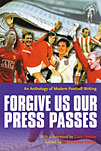 An Anthology Of Modern Football Writing
An Anthology Of Modern Football Writing
edited by Christopher Davies
Know the Score, £19.99
Reviewed by Terry Staunton
From WSC 265 March 2009
That title’s not the best pun you’ve ever read, is it? Not nearly as clever, witty or inspired as sports headlines can be, but it’s the first word that’s the main problem: what does it say about a book when the authors are seemingly apologising on the cover? Perhaps it’s unfair to be too petty when it comes to charity projects, and a cause such as Great Ormond Street Hospital (which benefits from sales of this book) is the epitome of worthy, but the Football Writers Association’s idea of inviting nearly 70 journalists to pen a fresh piece on any aspect of the game they choose was bound to be somewhat hit-and-miss.
When your day job involves covering pretty much the same half-dozen stories (transfer speculation, manager under pressure/sacked, players’/fans’ revolts, club takeover rumours, etc) with interchangeable names and locations, trying anything else can be a bit tricky. Several contributors to this book are so entrenched in the rigid argot of back page journalism that when given the opportunity to fly free, all they can do is flap ineffectually.
Steve Bates of the People is most likely a very fine chap indeed, but a witty raconteur he is not. He claims to be a “family friend” of the Atkinsons, so surely he should be able to offer us a better anecdote than Big Ron being a bit miffed about a headline on the day of his daughter’s wedding? News of the World scribe Rob Beasley’s account of trying to hang on to the exclusive on Roman Abramovich buying Chelsea for five days before the presses rolled is so smug and self-aggrandising that readers may find themselves rooting for him to be scooped by one of the dailies at the 11th hour. Which, of course, he was.
Lambasting the cliches of mainstream sports writing is a cliche in itself, though. Obviously, there are fewer Stephen Frys in the world than there are Clive Tyldsleys, so when there is a genuinely evocative and literate essay in the book it’s joyously refreshing. Reuters sports editor Mike Collett spent his boyhood mopping floors and washing dishes in his uncle’s cafe opposite Wembley station, and his recollections of ticketless fans being given the chance to watch the game in a smoke-filled upstairs room on a tiny black-and-white TV (the birth of pay-per-view, he suggests) warms the heart. When, one year, a stranger offers him a ticket for the game itself it reads like the hero of a boy’s own adventure story vanquishing the villain.
Similarly, the Guardian’s Jon Brodkin perfectly conveys the atmosphere, humour and heartache of following a lower league team when he chronicles the tempestuous times of Barnet during the Barry Fry era and beyond, but for the most part an air of “will this do?” permeates the pages here. Ultimately, however, with the royalties going where they are, is it really that important how good the book is? After all, that Band Aid single was pretty lame, but we still bought it.